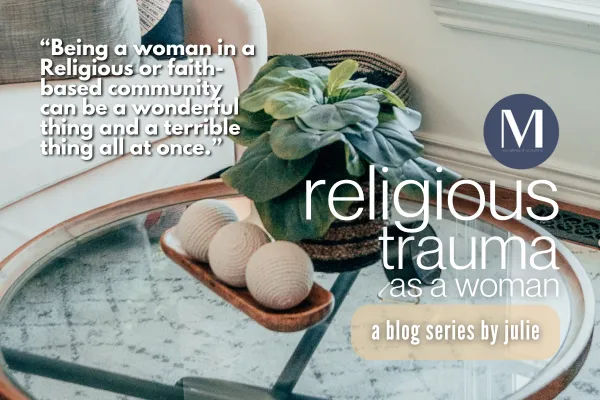the blog
A place for our team to share about topics they are passionate about, in hopes of allowing you to see and understand a bit more behind the faces on these pages.

Religious Trauma: As a Woman
Being a woman in a religious or faith based community can be a wonderful thing and a terrible thing all at once. There can be a deep sense of community, friendship, and a persistent message of not being seen, heard, or having autonomy. This is being written from the perspective of a woman who has experienced extensive religious trauma throughout my lifetime - where the messages that I received still impact me to this day. Some of my best friends to this day are people that I’ve met through faith based communities. We love each other, trust each other, and do life together. There is lots of space for talking and processing through the harm that has come to some of us through the faith based communities we’ve been a part of. We also challenge each other to not live in the trauma, but to work through it and figure out who we are outside of what has happened to us.
I use the language of “what happened to us” very intentionally. Being a woman growing up in a faith based community, the message that we receive is that we’re too much and not enough all at the same time - that we are to be submissive, respectful, honouring and pure servants, helpers, wives and mothers. Our role from the time we are little is to be a wife and mother - that is the sole purpose. And it’s even better if we can be a pastor’s wife AND be a mother. I distinctly remember my mother telling me when I was about 12 years old that she was planning on having me marry a youth pastor. The pleasure she expressed when I told her I wanted to have 7 children - it was like I just handed her a dream come true.
We are taught that we are to be gentle, quiet, helpful, prayerful, merciful, kind, dependent, and feminine - but not sexual. Women needed to be a follower, not a leader. Except for if we work with children, then we can lead. But we cannot lead men because “Men must be the leaders in the community and in our households.” We as women are not allowed to be. Women are often taught to be in a fawn state to survive in religious environments. This fawn state is connected to the 4 trauma responses of fight, flight, fawn and freeze. Fawn in the area of women in faith based communities often looks like not having a voice, that our needs are not as important as the men in our lives or the community as a whole. That we have to tolerate how we’re treated because maybe our husbands are struggling or the leaders are struggling and we have to show them grace. There is no space for self-expression unless it’s within the specific roles allowed within the community. We are taught that to survive and be accepted within the community we have to fit these specific gender roles and if we don’t, then we aren’t accepted and people will pray for us to repent and figure out that these roles are the best roles for us.
I was in a group study environment that was promoted to be about healing from our stories. There was a page in the workbook that had a list of attributes and we needed to circle the 10 we felt best described us. There was a page for women and a page for men. I remember staring at it and getting really, really angry. The 10 attributes that I resonated with the most were on the man’s side, not the woman’s side. They were attributes like strong, confident, independent, initiative, leadership, communicator, problem solver, etc. I remember sitting around the table in a group and bringing up the problem that I so distinctly saw in this workbook and how these characteristics are not male or female, they just are. I was promptly told that I needed to go to therapy to work through my anger and that maybe I had more problems because I resonated with the attributes on that side of the page versus the woman’s side. I remember sitting there dumbfounded with my jaw almost hitting the floor and my head popping off because I was so angry. We were in a space where we were supposed to be accepted as we are. Instead we had to fit these ideals of what it looked like to be a woman within the faith community.
As a woman in a faith based community, sometimes religious trauma can look like many incidents of being dismissed, not having a voice, or feeling like she doesn’t fit because she doesn’t fit the accepted role within the community. It can expand to sexual abuse within the community or by leaders, with the message being that it has to be a secret and that they wouldn’t be here if she didn’t tempt the leader. It can be forced marriage, or forced submission and helping because it’s what “god wants.” There is a very broad spectrum of spiritual abuse and religious trauma that women experience and these are just some examples. I have heard all of the above, plus more.
If you’re a woman that has experienced religious trauma and aren’t sure what to do or where to go, I would strongly encourage you to start to speak to someone outside of your faith community to help you start to unpack what’s happened and how you’re feeling about your experiences. If you’re not sure where to start or where to look, I would recommend reaching out to a therapist who can be a neutral third party in your unpacking. If you’re not sure where to start, feel free to reach out to us. We would be happy to plug you into someone on our team. If you’d rather not see someone on our team, just let us know and we can try to help you find someone else that can help you unpack these things.
Office Location: 1200 Brock Street South, Whitby, ON. L1N 4L9
© Marquis Counselling & Consulting | ALL RIGHTS RESERVED | TERMS & CONDITIONS | PRIVACY POLICY

